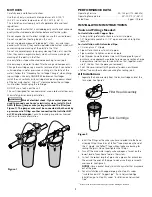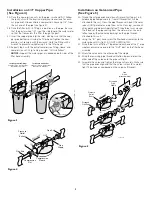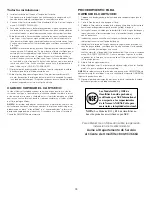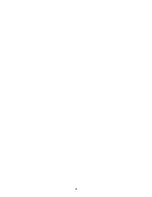
2
NOTICES
Carefully read and follow instructions.
Use the unit only in ambient air temperatures of 35–100° F
(2–38° C) and water temperatures of 35–100°F (2–38° C).
This installation must comply with all applicable state and local
regulations.
Do not use with water that is microbiologically unsafe or of unknown
quality without adequate disinfection before or after the system.
Do not expose the unit to direct sunlight or use this unit outdoors.
Do not use electrical heating tape on this unit.
Do not use pipe compound (“pipe dope”), sticks, or similar com-
pounds with this unit; they contain petroleum derivatives which will
cause crazing and cracking of the plastic in the filter.
Do not use aerosol sprays (bug spray, cleaning fluids, etc.) near the
filter; they contain organic solvents which will cause crazing and
cracking of the plastic in the filter.
Use only Teflon
TM
tape without adhesive backing to seal joints.
Use only soap and water to clean filter housing and components.
Change the cartridge every 3 months (or more often if you notice a
sustained drop in water pressure or a change in the taste of the
water). Follow the “Procedure For Cartridge Change” when chang-
ing cartridges. Use only OMNIFILTER replacement cartridges.
Install the unit vertically (with cartridge tank pointing down) ahead
of the hot water heater. Allow 3” clearance below the cartridge
tank to allow for changing the cartridge.
DO NOT use a torch near the unit.
This unit is designed for non-commercial use on cold water lines only.
Wear safety glasses during installation.
Risk of electrical shock. If your water pipes are
used to ground your house’s electrical system, install a No. 8
AWG (8.4mm
2
) jumper wire (or larger) around the filter (see
Figure 1). The jumper wire must be connected at both ends by
a pressure wire fitting or other connection that satisfies NEC
or CEC and local codes.
Consult a building inspector or licensed
electrician for more information.
PERFORMANCE DATA
Operating Pressure: . . . . . . . . . . . . . . . .25–125 psi (172–862 kPa)
Operating Temperature: . . . . . . . . . . . . . . .35°–100° F (2°–38° C)
Rated Flow: . . . . . . . . . . . . . . . . . . . . . . . . . . . . .5 gpm (19 lpm)
INSTALLATION INSTRUCTIONS
Tools and Fittings Needed:
For Installation with Copper Pipe:
• Tubing cutter (preferred) or hacksaw to cut into pipes
• 10” Adjustable wrench or 1-1/4” open end wrench to tighten
locknuts
For Installation with Galvanized Pipe:
• 1 Union plus a 2” Nipple
• Pipe cutter or hacksaw to cut into pipes
• Pipe wrenches to tighten union and nipple
• Pipe threader (some hardware stores will thread pipe for you at
purchase – one approach would be to remove one section of pipe
and purchase two sections for reinstallation that, together, meas-
ure 8” shorter than the piece you removed.)
• Paint thinner or solvent (NOT gasoline) to clean new threads
• Teflon
TM
tape without adhesive backing for sealing joints.
All Installations
1. Separate the head assembly from the tank cartridge and set the
tank aside. See Figure 2.
2. Install the fittings or the valves you have selected into the head
assembly. Wrap three turns of Teflon
TM
tape around each end of
the 2” nipple Use Teflon™ tape without adhesive backing for
sealing the joints. Do not overtighten the fittings.
3. Turn off the main water supply valve and open a faucet on the
lowest level of your home to drain the system.
4. Cut out the correct length of pipe. Use a pipe cutter or hacksaw.
File or sand the ends of the pipe to make sure they are smooth
and square. See Figure 3.
NOTICE:
Have a bucket handy to catch any water that may come
out of the pipe.
5. For an installation with copper pipe, go to Step 5A, under
“Installation on 3/4” Copper Pipe”. For a Galvanized Pipe
Installation, go to Step 5A, under “Installation on Galvanized
Pipe”.
TM
E.I. DuPont de Nemours, and Company, Corporation, Wilmington, Delaware.
Figure 1
Filter Head Assembly
Tank Cartridge
Figure 2






























